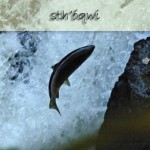Os lheq su la thq’étes álhtel, mes kweléxwes te sth’óqwi means ‘So (they) spear them, to catch the fish.’.
Audio: Elizabeth Herrling
Structure and Vocabulary
The structure of this phrase is as follows:
- osu – literally ‘so’, Elders use this as a general sentence connector and it does not always translate into English. (As is common, osu is split by an intervening word, in this case lheq)
- lheq – always, used to
- la – an untranslatable ‘auxilary’ (‘helper’) verb, related to lám – to go
- thq’ét – to spear (it)

- -es – Here, marks that a ‘third person’ (neither me nor you) is the subject. The third person subject in this case is ‘they’.
- álhtel – they, them
- me – related to the meaning ‘to come’, but here used as an untranslatable auxiliary (‘helper’) verb.
- -s – here marks that that there is a third person subject (neither you nor me). Here, the third person subject is an understood ‘they‘.
- kwélexw – to get, to catch (EH stresses the second syllable, which may be a different form of the verb)

- -es – here, another marker that there is a third person subject (certain verbs require this ending in addition to the other third person subject marker on the auxiliary).
- te – the
- sth’óqwi –fish




No comments yet.